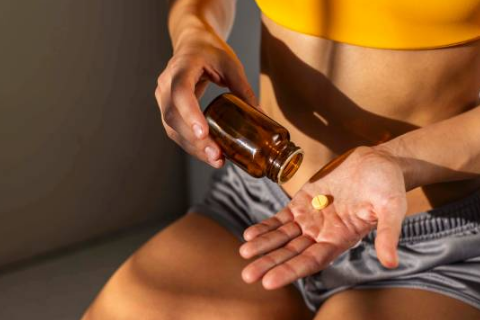Consistent and challenging physical activity promotes muscle growth—but recovery is key to proper healing and growth.
Muscle recovery is the process where your body repairs and rebuilds tissue after physical activity. Proper sleep, hydration, and nutrition all play crucial roles. Some people also find that supplements can help support muscle repair and recovery. In fact, anywhere from 40% to 100% of athletes use some form of supplementation to improve and maintain physical performance.
Here are seven popular supplements that may help with muscle recovery—including creatine, BCAAs, and vitamin C.
1. Creatine
Creatine is often used to boost performance, reduce inflammation, and increase energy. It may also offer anti-inflammatory and antioxidant benefits.
Taking creatine after intense workouts may reduce markers of muscle damage. People who use creatine post-exercise often show lower levels of inflammation, oxidative stress, and muscle breakdown.

Creatine is naturally found in animal products like beef, pork, and seafood, and is also available as a supplement. A typical regimen includes 20 grams per day for 7 days, followed by 3–5 grams daily for up to 12 weeks.
2. Branched-Chain Amino Acids (BCAAs)
BCAAs are essential amino acids that your body can’t produce on its own. They play a major role in oxidation, protein synthesis, and metabolism. BCAAs are believed to improve muscle soreness, fatigue, and energy levels, and may enhance overall workout performance.
Foods naturally high in BCAAs include dairy, meat, nuts, and seeds. Supplementing with up to 20 grams per day for six weeks is considered safe. For best results, take 2–10 grams daily, starting at least three days before exercise, and continue before and after workouts.
3. Omega-3 Fatty Acids
Omega-3s are essential for inflammation control, heart health, and cell function. They’re often used to reduce post-workout muscle soreness, oxidative stress, and inflammation.
The recommended daily intake is 1.6 grams for men and 1.1 grams for women. Omega-3s are found in plant oils, chia seeds, fish, and supplements like fish oil.
4. Magnesium
Magnesium is a mineral essential to nearly every bodily process, including energy production and nerve and muscle function. It plays a role in reducing inflammation, supporting muscle contractions, and promoting protein synthesis.
Supplementing with magnesium may ease muscle soreness, speed up recovery, boost athletic performance, and help prevent injury. It’s particularly important for energy and muscle contraction, which directly affect how well your muscles recover.
Magnesium is naturally found in seeds, legumes, leafy greens, nuts, seafood, whole grains, and fortified cereals. Supplements are also available.
The recommended daily amount is 400–420 mg for men and 310–320 mg for women. It’s best taken at least two hours before physical activity.
5. Tart Cherry Juice
Tart cherry juice is known to reduce muscle soreness, inflammation, and damage, making it a great recovery tool.
Its benefits come from its strong anti-inflammatory and antioxidant properties. However, it’s typically most helpful for people involved in advanced physical training who need to recover quickly.
Tart cherry is available as juice, concentrates, powders, and capsules. While there’s no official dosage, 240–480 ml per day is commonly used in studies.
6. Turmeric
Turmeric and its active compound curcumin are well-known for their anti-inflammatory and antioxidant properties.
Studies on turmeric’s benefits for muscle recovery are mixed—some show little to no effect, while others suggest it may reduce inflammation after exercise. More high-quality research is needed to confirm its effectiveness.
A typical dose is 1.5 to 5 grams per day, and anything under 8 grams daily is generally considered safe.
7. Vitamin D
Vitamin D occurs naturally in fatty fish and dairy products and can also be synthesized through sunlight exposure. It may help reduce inflammation during intense physical training.
Experts believe that taking vitamin D before high-intensity exercise may reduce post-exercise inflammation. It’s especially helpful for people who are deficient or low in vitamin D.
There is no set dosage specifically for muscle recovery, but a common recommendation is 3,000 to 5,000 IU per day (equivalent to 75–125 micrograms).

